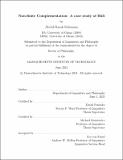Non-finite Complementation: A case study of Bùlì
Author(s)
Sulemana, Abdul-Razak
DownloadThesis PDF (565.7Kb)
Advisor
Pesetsky, David
Kenstowicz, Michael
Terms of use
Metadata
Show full item recordAbstract
This dissertation analyzes a number topical issues in Bùlì syntax as a way of contributing to both the theoretical and typological literature in the area of clausal complementation, control, serial verb constructions, and temporal markers. Among the questions addressed are (1) Does Bùlì possess non-finite clauses? (2) How should serial verb constructions be analyzed? (3) Are the temporal remoteness markers in Bùlì tense markers?
This dissertation represents an attempt to provide partial answers to these questions for Bùlì, a Mabia (Gur) language spoken in Sandema in the Upper East Region of Ghana. While the main concern of the dissertation is Universal Grammar (UG) and linguistic typology, I have, in the discussions, provided a substantial amount of descriptive as well as analytical material concerning these aspects of the grammar of Bùlì. The main claim of the dissertation is that Bùlì possesses two kinds of non-finite complements: (1) Non-finite complements with obligatory overt pronominal subjects that must be co-indexed with matrix argument, (2) Non-finite complements at allow full DPs in their subject position. Also, it reviews the properties of serial verb constructions and argues that they are best analyzed as instances of coordination. Finally with regards to the temporal remoteness markers, it argues that they are optional tenses.
Date issued
2021-06Department
Massachusetts Institute of Technology. Department of Linguistics and PhilosophyPublisher
Massachusetts Institute of Technology